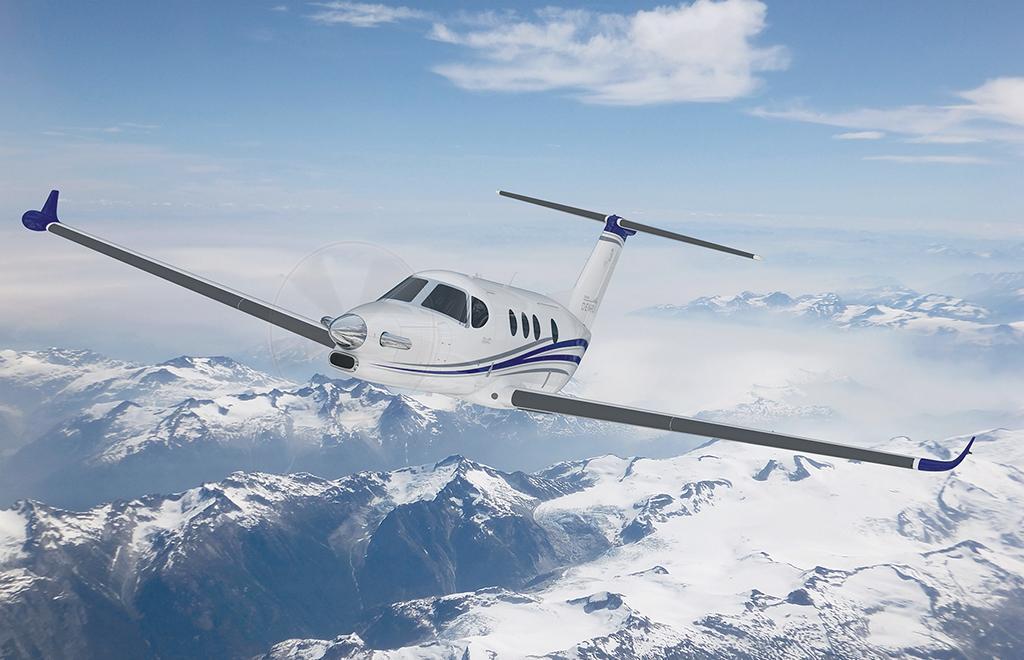What’s Ahead In 2021 For Business Aviation? Leaders Weigh In (Part 1)

As 2019 came to a close, few could have predicted that the business and general aviation industry would be grappling with a worldwide COVID-19 pandemic in 2020. With a vaccine on the horizon, The Weekly of Business Aviation polled industry leaders about their predictions for 2021. Below is Part One of a two-part series. Watch for the second part in the Jan. 11, 2021, edition.
Q: What do you think will be the most significant story of 2021 as it relates to the business and general aviation industry?
Éric Martel, Bombardier president and CEO:
There’s no doubt the pandemic of 2020 will have a lasting impact on many industries, including the travel industry. One of the biggest stories for 2021 will be how the health crisis led to a wave of new private air customers, and the high percentage of those customers who choose to continue to fly private once the pandemic is behind us. This new customer base has the potential to drive overall demand to new highs as international borders open and business travel returns to pre-COVID levels. It is not surprising that the advantages of business aviation are much more appreciated and valued today. Business jets allow travelers full control of their flight experience–from reduced wait times and interactions at airports to our cabin environments that offer excellent air quality through HEPA filters. So, unlike other crises, business aviation has the potential to lead the recovery.
Eric Trappier, Dassault Aviation chairman and CEO:
Certainly, the industry is focused on an economic recovery in 2021 as vaccines roll out and Covid-19 is brought under control, though recovery may take longer than we all might wish. With airlines still reeling in this period and schedules reduced, business aviation will even further demonstrate its flexibility and agility serving business users, entrepreneurs and executives, and will play an important role in breathing new life into cross-border economies. Our industry has always shown great vision in staying focused on long-term development, in getting through ups and downs. We—the OEMs—have to continue investing on the innovations that drive our business—innovations in the critical areas of safety, performance and efficiency.
Brian Foley, Brian Foley Associates founder, consultant:
I believe the industry’s bounce back in 2021 will be more decisive than most are expecting right now. Despite overall business travel falling off a cliff, business aviation usage has fallen just 15% on average from previous levels, whereas airlines have seen a 65% drop. This suggests that leisure flights and new users in private aviation have fundamentally increased, so that when business trips return in the last half on 2021, they should push utilization beyond 2019 levels. This will help drive businesses which are flight activity dependent such as charter, fractional, FBOs and MROs. I also believe new aircraft sales will see more activity than is currently anticipated. Watch for objective evidence as book-to-bill figures from manufacturers show a steady increase, along with backlog values. Since orders take a while to manifest themselves as deliveries, we’ll start to notice real shipment improvement as the year progresses with momentum continuing into subsequent years. The expected improvement in new sales is supported by the strength the pre-owned market has shown, which according to preliminary Amstat data suggests transactions could equal or exceed 2019 levels. Given this outstanding sales performance, it’s conceivable that new aircraft will be next to benefit since new and pre-owned sales have generally fallen or risen together, albeit with a time lag at times. Other positive factors include having elections behind us and seeing light at the end of the pandemic tunnel.
Michael Amalfitano, Embraer Executive Jets president and CEO:
The business and private aviation industry has seen a flurry of activity from first-time buyers and first-time users in 2020. As of now, fractional and charter operators are reporting that individuals are flying for “personal” rather than “business” reasons. We believe the main storyline for 2021 will be business-driven traffic regaining pace and possibly aggregating more sustainable industry sales growth in the short term. Corporate owners and investors are reassessing their fleet plans, and we may even witness some cases of fleet rightsizing. We expect corporations will favor innovative aircraft models, with superior technology, comfort, and performance. Aircraft offering a combination of mission flexibility and residual value retention will excel.
Jack Pelton, Experimental Aircraft Association chairman of the board and CEO:
I think the vaccine is a part of the story for 2021. It plays into how will supply chains, aircraft manufacturing and major aviation events recover in 2021. If the current rollout of the vaccines stays to the initial timeline, we could see a vast improvement by July in how people work and capability to expand markets. Of course, that means events would be coming back in a more normal fashion. I think it is imperative that in advance of the rollout we have to as a nation turn the positive test curve down quickly. If not, it delays the positive impact of getting to herd immunity. At a minimum, having a light at the end of the COVID tunnel for 2021 will be cathartic. As that time gets closer, we will see what the real financial impact to general aviation has been.
Pete Bunce, General Aviation Manufacturers Association president and CEO:
One of the major challenges that we will face in 2021 will be navigating our way into the new normal. For most of 2020, business meetings have been conducted in a virtual setting, which has changed the landscape in which the world operates. The traditional utilization of air travel for business will be impacted by the pace of global deployment of the vaccine. It will be important to distribute accurate data on the health and safety situation of countries and regions around the globe so that confidence in business travel can resume and the bonds and relationships that only come from in-person, face-to-face business meetings, gatherings, and conventions can be re-established.
Mark Burns, Gulfstream Aerospace president:
I think one of the most significant stories of 2021 will be an accelerated market rebound. During this devastating pandemic, companies and individuals alike reaffirmed the benefits business aviation provides, including convenience, connection, safety, security, control and flexibility. And now, these benefits have been recognized by even more people as new users embrace the value of our industry. While the vaccine will not erase how the world–and we–have changed in 2020, we anticipate that as the worldwide economy rebounds, people will be searching for ways to achieve their goals while still protecting the health and safety of their colleagues, family and friends. Business aviation is a clear and compelling way for them to do that while maintaining confidence and total control over their environment, passengers and schedule.
Brant Dahlfors, Jet Transactions co-founder:
The pandemic itself has made people on the fringe realize that private travel is significantly more valuable than previously thought. The gap between cost and perceived value has narrowed. We have seen a significant number of first-time buyers enter the market and see private travel much less of a luxury and more of a safety issue.
Ed Bolen, National Business Aviation Association president and CEO:
It’s obvious we’re ending a brutal year on a note of optimism as the vaccines are beginning to roll out. Obviously, how effective the vaccines are and how widely available they are will have a big impact on the economies around the world and on business travel. If you look through our histories, growing economies increase demand for business transportation. We’re hopeful that the vaccines are widely available, widely adopted and lead to a robust economic environment. One of the unique opportunities is that business aviation can lead the way out of the economic challenges and the reopening of the global economy. I think what you’ll see if after these restrictions have been in place for a very long time, (and vaccines get out), and we return to a global marketplace, business aviation will be a leader in recovery. That has the opportunity to be a big story this year.
Rolland Vincent, president of Rolland Vincent Associates, a consultancy firm:
The vaccine and recovery trajectory, for sure. I think that we will get through most of 2021 before international travel restrictions begin to be removed, and people begin to fly more frequently on all sorts of airplanes (commercial and B&GA). It should be another good year for business aircraft utilization and pre-owned aircraft sales in particular.
Ron Draper, Textron Aviation president and CEO:
I think it’s safe to say that the biggest story of 2021 will be how our industry evolves as the impact of the pandemic, hopefully, diminishes in light of a successful vaccine deployment. Despite all of the challenges our industry has faced during 2020, there is a sense of cautious optimism for private and business aviation for 2021 and beyond. While we have seen an increase in personal travel over the second half of the year and private aviation flight activity nearing 2019 levels, we have yet to see the full return of the corporate and business travelers. When we do, I believe our industry is going to be poised for potential future growth as more people learn about and experience the benefits of business and general aviation. And Textron Aviation, with our nine-decade heritage, is ready to support customers with our broad lineup of industry-leading products and world-class workforce. The new year will also bring continued milestone achievements for our new aircraft development programs–the Cessna SkyCourier and Denali. With SkyCourier certification and entry into service expected later in the year, Textron Aviation is looking forward to bringing a clean-sheet aircraft into a new market segment in support of our launch customer, FedEx, and others who seek the most efficient utility solution. We also anticipate the Denali making its official debut in 2021 as the development program ramps up. We look forward to seeing another innovative creation–designed and built by our talented workforce–gracing the Kansas skies when the Denali takes flight in the second half of the year ... Our aim for 2021 and beyond is to continue to introduce investments that will offer additional capabilities and enhancements for our customers across our broad products and services.
Ian Moore, VistaJet chief commercial officer:
In 2020, our model of asset-light private flying has proven to be the ultimate solution for customers worldwide. We will continue to invest in our infrastructure, fleet and people as we strongly believe that business aviation is as vital now as it ever has been, and our network will be even more vital to support businesses and the global economy in 2021 and beyond. Previous to the pandemic, only around 10% of people who can afford to fly private do, 71% of our new incoming requests at VistaJet are from passengers who have not regularly used business aviation solutions before; a trend that will likely continue into 2021. As customers take comfort in VistaJet’s commitment to security, flexibility of travel and privacy, which are not guaranteed by any other type of transport during times of instability, we remain committed to flying our existing members and the new customer base we’ve garnered this past year.
To come in Part 2: Leaders weigh in on the question: What will be the biggest goal or challenge for your business or your members and the industry in 2021?
Editor's Note: The article has been updated to include comments from Eric Trappier, Dassault Aviation chairman and CEO.





